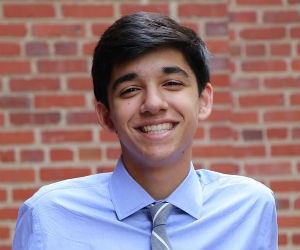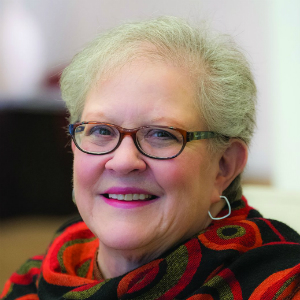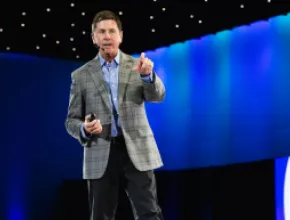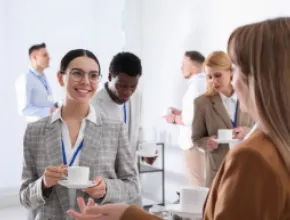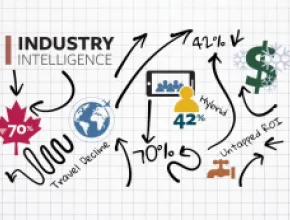When I read the print edition of Businessweek in which the three principals of Jüv Consulting were featured, I was intrigued by how they met and them in general. As a baby boomer who hears all the time from other boomers and Geneneration Yers about how lazy both millennials and Generation Z are, I wanted to learn more from these three—who are, as you will see in the responses below, in no way lazy—about their work.
If it had been possible to meet face to face and record the entire conversation, we'd have gone even deeper. I've asked them, time permitting and without asking them to consult for free, to respond to questions in the comment area of the related Friday With Joan blog so that perhaps we can enhance the conversation among generations. For now, see what they have to say about their generation and learn how it can impact the marketing and performance of meetings and hospitality industry providers. I am grateful to all three for their input.
Jüv Consulting's founders:
Nick Jain: Chief Operating Officer
Ziad Ahmed: Chief Visionary Officer
Melinda Guo: Chief Executive Officer
Q1: In reading the Nov. 30, 2016, print edition of Businessweek, I was drawn to the article about the three of you and Jüv Consulting, and that you met at a Cornell University—known to those in the hospitality industry for their hotel school—camp for high school students intrigued me about the three of you, the structure of the “camp” and how my (hospitality/meetings) industry can make changes in marketing and structure.
Tell us about the format and structure of the camp, how it was conducted and what facilitated the three of you connecting. Was it what most of us think of as a “traditional camp” with an edge? Or did it look like a business meeting, which often looks like the worst high school setup, with rooms with chairs in rows?
What elements did it have that made it conducive to you beginning this process? Add your thoughts about the camp itself; things that readers who plan meetings could use to enhance how traditional meetings could be less traditional and more interactive, informative and push the desire to learn and move forward.
A1: The camp was Cornell University’s Summer College. Essentially, the essence of the camp is that it is an opportunity for high school students to take college courses on a college campus, thereby being able to experience a sense of college life. Therefore, the camp was run very similarly to the way college will feel in some ways (obviously with greater restrictions considering that we were just in high school). At the camp, Ziad (Ahmed) and Melinda (Guo) were in a business course, and I (Nick) was in a debate and rhetoric course.
We were all there at the same time, just in two different courses. Throughout the three weeks that we spent there we got to spend many hours considering topics within the business world (in the case of Ziad and Melinda) and how to appeal to various people (in my course), and overwhelmingly, we began to see many flaws in the way that the business world was attempting to market to teens across the world.
Cornell Summer College gave us a platform to discuss the issues of the business world, and after having done so we came to realize that many of these flaws were coming from adults trying to be teen experts.
We are something far simpler, yet far more profound—we are teens.
There is no other company out on the market that understands the teenage demographic in the authentic way that we do—real teenagers with real understandings for real solutions.
Q2: From this initial interaction came Jüv Consulting and Vine, “a pool of about 300 teens from various socioeconomic backgrounds around the world—a global focus group for hire.” Have hotel companies or CVBs or corporations or associations who create meetings and conventions, contacted you about how to appeal more broadly generationally? I ask because what I’ve seen is that hotels are bending over backwards to create what they believe are guest rooms and public spaces that appeal to millennials only and are not conducive to, well, aging boomers and to people with disabilities. If you’ve either worked with hotel companies or if you could entice them to work with you, what would be the start of the conversation?
A2: We haven’t yet had a client from the hospitality sector, but we would certainly be interested in exploring that. The tourism industry is constantly looking for ways to innovate to accommodate for the changing trends of their visitors, and [we] certainly think we could be useful in assisting with that.
It is important to note though that Generation Z are those born after 1996, so the oldest members of Generation Z are only 20 years old. This means that many members of Generation Z are in school or still living at home and do not yet stay at hotels with their own dollars or without their families. In a few years, as Generation Z emerges more into the workforce, hotel companies will certainly be more interested in our services, and I think we would start the conversation simply by saying, “If you’re interested in having our contemporaries be interested in your hotel, interacting with those contemporaries directly is probably a good place to start.”
Q3: Ziad: It was written that you were “devoted to a diversity nonprofit” you’d started. How has that informed, in addition to the varied pool of Vine participants, your work with clients? In the increasing diversity and more nationalism in the U.S. and around the world, what will that mean to marketing? What are some good examples of changing marketing to be inclusive of a diverse marketplace?
A3, with responses from Ziad: My work with Redefy informs pretty much everything that I do, and has certainly translated into my work with JÜV Consulting in a very real way.
Most obviously, my commitment to diversity is exemplified through the emphasis we have taken to have a team of consultants and a team on the Vine that reflects the diversity (of all sorts) that exists in the world. Beyond that, we are still actively recruiting consultants and Vine members from communities that are not adequately already represented on our team, and that is a massive priority for me as CVO (chief visionary officer).
Furthermore, my commitment to equality is also realized in how we attempt to create our company culture as we seek to cultivate a sense of belonging, understanding and purpose. In regards to marketing, it is certainly true that there is increased diversity and nationalism in the U.S., but what you will find is that those from Generation Z tend to embrace the narrative of diversity far more than that of nationalism.
Our generation (for the most part) loves advertisements that celebrate different identities, and there are countless examples of that whether it be having diverse actors in commercials: James Charles becoming a CoverGirl or hijabi models at New York Fashion Week (NYFW).
The future of marketing is certainly centered around uplifting marginalized people, and we definitely think that is a powerful tool that many companies/brands should consider to gain Generation Z interest.
Q4: Boomers and Xers, in particular, seem to be always angry at millennials and Gen Z, using so many stereotypes of what they perceive to fuel their anger. What do you think contributes to those stereotypes?
In what ways, in addition to hiring Jüv Consulting, can we all begin to break down the preconceptions for interaction in communities? At work? In marketing?
A4: [We] think a lot of what contributes to those stereotypes is just the fact that we have grown up to do our work and be successful in a different way than many members of older generation(s). A lot of boomers and Gen Xers see us as being easily distracted or unable to focus because of the fact that we have grown up multitasking and doing a million different things in a given day, but I think it is important to notice that part of who we are is being able to do many different activities, and pushing ourselves to do and be as much as we can.
Generation Z as a whole generally rejects the notion that you should be good at one thing and stick with that one thing and do it monotonously and continuously. Instead, members of our generation take a vastly different approach, and this can create many negative stereotypes surrounding our generation, but it goes back to the idea that the way we work and the way we perceive ourselves to be successful [varies from other generations].
Additionally, possibly one of the most common stereotypes is that we have extremely [short] attention spans, and quite frankly this can be true, but it is important to recognize that this goes back to the importance we place on efficiency. So many members of Generation Z are trying to do so much that we hate the feeling that we are wasting time. In this way, when we see an ad, we expect to be intrigued after the first few seconds.
Again, these stereotypes can often cause others to feel angry because they don’t necessarily understand the place that they are coming from.
Yes, we may lose attention easily, but no, that’s not because we don’t care about what’s going on around us. In fact it’s often quite the opposite, as we feel as though we aren’t bettering the world when we are wasting time.
Finally, we expect results and we expect perfection. In this way, we can often seem as though we need to be instantly gratified, but what is interesting is to think about the extent to which this is a bad thing.
In our drive and expectation for perfection, we often raise the level of efficacy in the work we do and the work of our peers, and therefore, before casting negative judgement on any of our tendencies, it is important to think about why we might have these certain characteristics, and what effect they actually have. Consider the notion that observations become harmful stereotypes when misconstrued meaning is attached to them.
Q5: The Bloomberg Businessweek article says “Those born after 1996 make up almost a quarter of the U.S. population and wield $44 billion in buying power.” That’s a huge audience for conventions, tourism and hotels. What’s your best advice, without giving away all your knowledge for free, to those in my industry to begin to change perceptions for this market?
A5: Potentially the most important piece of advice that we can give clients is the importance of social media. Having grown up using it, Generation Z essentially speaks it “fluently,” and it is vital for companies and brands to be able to do so as well in order to catch the attention of Generation Z and be able to effectively market to them.
As teens move away from more conventional forms of entertainment, the way brands market to Generation Z becomes more important and more nuanced. Marketing materials have to appeal to Generation Z’s social media standards and have to quickly engage the viewer if they even want to be seen. More specifically to hotels, it’s essential to note that Generation Z expects perfection. The majority of us (in the U.S. at least) have been brought up in a reality where a slight lag on a website is enough for us to be frustrated.
Furthermore, Generation Z does not have the same brand loyalty that generations before us have, and we are certainly willing to abandon brands to find the best product. Ultimately, we want things to feel authentic, genuine, welcoming and most importantly, not cringe-worthy, but my best advice to hotels seeking to pivot to market toward Generation Z is really the basis of this company—talk to us. We exist in a three-dimensional world and whether it be JÜV Consulting or your nephew twice-removed, talk to a member of Generation Z and get a pulse on the evolving complexities that make up the fabric of our generation.
CONTACT INFORMATION for Jüv Consulting:
Website: http://www.juvconsulting.com
Facebook: www.facebook.com/JUVConsulting
Twitter: @JUVConsulting.
And if you missed it, click here to view the March 2017 edition of the Friday With Joan newsletter for even more related content. Make sure to check out and respond to the poll in the right-hand column (What's Your Take?).



